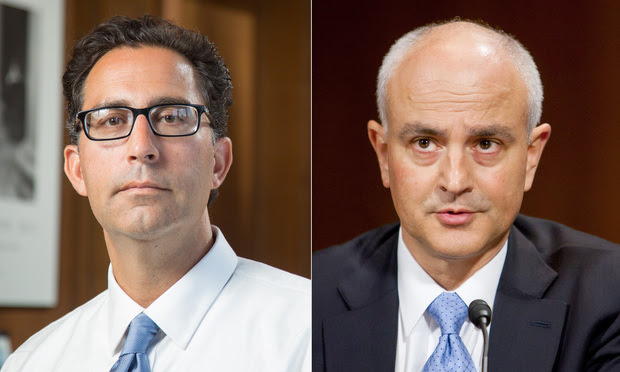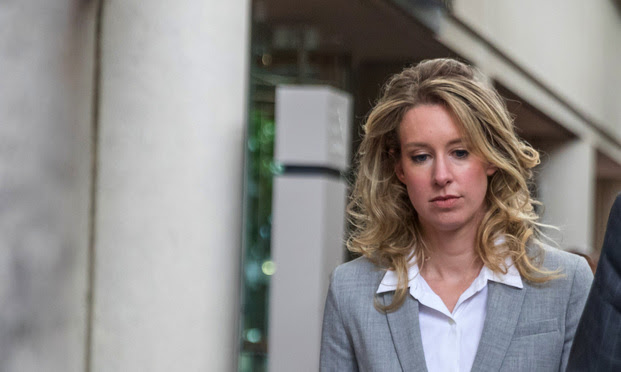What's Next: A Tale of Two Facebook Judges + When and How Can Elizabeth Holmes Go to Trial? + The Latest Tech Company Sued for Alleged Boardroom Racism
Two judges appeared skeptical of privacy lawsuits targeting the social media giant.
July 22, 2020 at 07:30 AM
10 minute read
Welcome back for another week of What's Next, where we report on the intersection of law and technology. Here's what we've got for you today:
>> Two Facebook privacy suits get pushback from federal judges.
>> A judge grapples with conducting Elizabeth Holmes' jury trial during the COVID-19 pandemic.
>> See which tech giant is the latest to be called out for not having a single Black board member.
Let's chat: Email me at [email protected] and follow me on Twitter at @a_lancaster.
SPONSORED BY ALM
Announcing Two Incredible Keynote Speakers for the Women, Influence & Power in Law Conference
WIPL is known for having some of the most engaging and energizing keynote speakers attend to share their thoughts, experiences, war stories and tips on effective leadership. And this year is no exception. This year, we are grateful to welcome two remarkable women come and inspire us: Tina Tchen, the President and CEO of the "Times Up" Legal Defense Fund and Paula Boggs, Founder of Boggs Media LLC and Former Executive Vice President, General Counsel and Secretary, Law and Corporate Affairs at Starbucks from 2002-2012. READ MORE
 U.S. District Judges Vince Chhabria and James Donato.
U.S. District Judges Vince Chhabria and James Donato.
Two Skeptical Judges Cast Doubt in Facebook Privacy Suits
"I'll try to be as blunt as I can about this," said U.S. District Judge Vince Chhabria at the top of a motion hearing in the litigation stemming from Facebook's Cambridge Analytica Scandal last week.
"I have a very hard time imagining that I would ever conclude it's appropriate to bring claims on behalf of all Facebook users in the U.K."
The judge put plaintiffs' counsel from Keller Rohrback and Bleichmar Fonti & Auld on notice that this was going to be a tough sell for the Northern District of California jurist. Plaintiffs counsel had filed a motion to amend their consolidated complaint to expand the class to our neighbors across the Atlantic.
Keller Rohrback's Derek Loeser said a contract the company had with U.K. users had a forum selection clause for California. But after the scandal broke in 2018, Loeser claims Facebook updated its contract for U.K. users with "language that's not wholly clear," and he argued the new contract does not apply to claims that had already occurred.
And then came a classic line of questioning from Chhabria.
"Why didn't you add all Facebook users in Australia or all Facebook users worldwide? Why did you pick the U.K.?"
Loeser said his team exercised restraint and decided to add a U.K. subclass because the origin of the scandal was there, referring to The Guardian breaking the story in March 2018.
"You're basing it on the fact that a U.K. publication broke the story?" the judge asked.
Chhabria asked if there's anything else he needs to know to make a definitive decision on whether it's appropriate to add U.K. plaintiffs to the case.
"We wouldn't be here if not for the California forum selection and law provision," Loeser said. "I guess I would say to you what would be the decision if they hadn't tried to change these terms?"
The judge admitted that he had not drilled down on the language of the prior forum selection clause.
Loeser said the court has a strong interest in making sure the type of "sneakiness" involved in Facebook's updated contract does not define the rights of Facebook users. "Instead what they've done here, after the fact, is rewrite the language and try to strip away the right of the user …" he said.
"What better court to consider those questions than a court in the U.K.?" Chhabria asked.
On Tuesday, Chhabria granted plaintiffs' motion to file a second amended consolidated complaint, still voicing his reservations.
"It seems very likely that the claims by the U.K. plaintiffs should be adjudicated in the U.K. rather than here, as a matter of both the 2018 revised terms of service and general principles of forum non conveniens," he wrote in the order. "But on the current record, the Court cannot conclude definitively that amendment with respect to named plaintiffs from the U.K. would be futile."
In another Northern District of California courtroom this week, Facebook and plaintiffs counsel will face U.S. District Judge James Donato, who is overseeing a $550 million proposed settlement over Facebook's tag suggestions.
Donato had been skeptical about the settlement, which seeks to resolve claims brought under Illinois' Biometric Information Privacy Act. In February, he asked the parties to explain why members of the class would get less than the $1,000 in statutory damages prescribed by the law.
In a June 4 hearing, the judge said, "It's $550 million. That's a lot. But the question is, is it really a lot?" according to a transcript of the hearing reviewed by NPR. "They are taking what is effectively a 98.75% discount off of the amount that the Illinois legislature said might be due in this case if you proved up your case."
On Thursday afternoon, the parties will get another crack at steering the litigation away from trial and convincing Donato that they have reached an appropriate settlement.
Keep an eye on The Recorder for updates later this week.
 Elizabeth Holmes, former CEO of now-defunct Theranos. (Photo: Jason Doiy/ALM)
Elizabeth Holmes, former CEO of now-defunct Theranos. (Photo: Jason Doiy/ALM)
Elizabeth Holmes Might Face New Trial Date and Updated Charges
In his empty federal courtroom in San Jose, California, the judge overseeing the fraud case against Theranos founder Elizabeth Holmes was left to reimagine what a jury trial looks like as coronavirus cases spike in some parts of the country.
"I'm sitting in the ceremonial courtroom alone, and I look out and try to envision what a jury trial for three months would look like here, maybe 12 jurors and 5 alternates, maybe more," said U.S. District Judge Edward Davila of the Northern District of California in a motions hearing via Zoom. Davila said he called Holmes' current Oct. 27 trial date a bit "ambitious."
Williams & Connolly's Lance Wade, who is representing Holmes in the case, suggested an April 2020 trial date, while Assistant U.S. Attorney Robert Leach said nine months was too long to wait and recommended February.
"I'm hopeful we can get the case tried in Q1 next year, but what that exact date is, I don't have the information to set that date today," Davila said.
In addition to a possible new trial date, last week the government filed a second superseding indictment against Holmes.
In the hearing, Holmes attorneys asked Davila to dismiss the superseding information, which the government filed on May 8. The information charges Holmes with wire fraud and conspiracy to commit wire fraud, doubles the timeframe of the alleged conspiracy and includes additional categories of victims.
Holmes' attorneys argued that the superseding information violates her Fifth Amendment rights, since she did not waive her right to prosecution by indictment. Despite the updated indictment, the attorneys want to remove the information from the docket, because the longer it sits there the longer the government can toll the six-month grace period to file certain charges against Holmes, they argued.
"I think Congress would be surprised that it had given the government such unilateral authority," Williams & Connolly's Amy Saharia said. "It's quite important that the court rule on the motion to dismiss the superseding information and not allow the government to have it sit on the docket indefinitely and use it to extend the grace period."
The government argued that the motion to dismiss the superseding information is moot after it filed the latest indictment. "The court should not dismiss superseding information," said Leach. "If the government filed an information and followed up with an indictment, the ordinary course would be to litigate the indictment and allow the information to sit there."

Qualcomm Latest Target of Shareholder Derivative Suit Alleging Corporate Racism
Bottini & Bottini is seeking to hold yet another tech company accountable for its statements regarding diversity and inclusion. In a shareholder derivative suit filed Friday in the Southern District of California, the firm called out Qualcomm for not appointing a single black person to their board or executive leadership.
The chipmaker's directors, according to the complaint, "wishing to avoid public backlash, have repeatedly made misrepresentations in the company's public statements by claiming to have a policy of 'demanding' diversity and inclusion at the company." But even its chief diversity officer, Vicki Mealer‐Burke, is white, the suit points out.
In addition to calling for three board members to resign in place of two Black individuals and one other minority, the complaint seeks to replace CEO Steve Mollenkopf with a non‐executive director who is independent.
Here are some of the other types of relief the suit asks the court for: >> Publish an annual diversity report. >> Create $800 million fund for hiring and developing minority employees. >> Require annual diversity training of board and executive officers. >> Set goals for Black and minority hires over the next five years. >> Adopt executive compensation program tied to diversity goals. >> Replace PWC as its auditor, which has audited the company since 1985, creating a "cozy and clubby relationship." >> Eliminate non‐disclosure agreements and mandatory arbitration for employees.

On the Radar
Mistrial Motion Says Jurors Worked Out, Checked Stove During Virtual Voir Dire in Asbestos Case "Voir dire one of the most important phases of a trial," said Edward Hugo, at San Francisco's Hugo Parker. "It's particularly critical in California where we have an incredibly diverse population. So the opportunities to determine the jurors' predilections, feelings about incredibly emotional topics like cancer, incredibly political topics like corporations, and corporate responsibility, are critical." Read more from Amanda Bronstad here.
Cisco Wins TRO Targeting Counterfeit Chinese Transceivers "The present action involves blatant unauthorized use of the CISCO Marks by Defendants, in their advertising for transceivers and sometimes on the transceivers themselves, and Defendants are based in China and use third-party eCommerce online platforms like Alibaba to market and sell their non-genuine Cisco products into the U.S.," wrote U.S. District Judge Edward Davila of the Northern District of California. "It is not only likely that Defendants can and will dissipate their assets during the pendency of this case if given the opportunity to do so, but it is also difficult if not impossible to enforce U.S. judgments in China." Read more from Scott Graham here.
Risk Assessment Tools Aren't Immune From Systemic Bias. So Why Use Them? "I think we have a great deal of indirect research that suggests that when we reduce the amount of discretion [officials] have when they're making decisions about people, we also tend to reduce the amount of racial disparity in those decisions," said Jennifer Skeem, professor of Public Policy at the University of California, Berkeley. "But that research has mostly been done in other contexts like policing and in employment decision making." Read more from Rhys Dipshan and Victoria Hudgins here.
Thanks for reading. We will be back next week with more What's Next. Stay safe and healthy, everyone.
This content has been archived. It is available through our partners, LexisNexis® and Bloomberg Law.
To view this content, please continue to their sites.
Not a Lexis Subscriber?
Subscribe Now
Not a Bloomberg Law Subscriber?
Subscribe Now
NOT FOR REPRINT
© 2025 ALM Global, LLC, All Rights Reserved. Request academic re-use from www.copyright.com. All other uses, submit a request to [email protected]. For more information visit Asset & Logo Licensing.
You Might Like
View All

What's Next: Judge to Quash Twitter Subpoena | SCOTUS Won't Review Trial Ban
4 minute read

Law Firms Mentioned
Trending Stories
Who Got The Work
J. Brugh Lower of Gibbons has entered an appearance for industrial equipment supplier Devco Corporation in a pending trademark infringement lawsuit. The suit, accusing the defendant of selling knock-off Graco products, was filed Dec. 18 in New Jersey District Court by Rivkin Radler on behalf of Graco Inc. and Graco Minnesota. The case, assigned to U.S. District Judge Zahid N. Quraishi, is 3:24-cv-11294, Graco Inc. et al v. Devco Corporation.
Who Got The Work
Rebecca Maller-Stein and Kent A. Yalowitz of Arnold & Porter Kaye Scholer have entered their appearances for Hanaco Venture Capital and its executives, Lior Prosor and David Frankel, in a pending securities lawsuit. The action, filed on Dec. 24 in New York Southern District Court by Zell, Aron & Co. on behalf of Goldeneye Advisors, accuses the defendants of negligently and fraudulently managing the plaintiff's $1 million investment. The case, assigned to U.S. District Judge Vernon S. Broderick, is 1:24-cv-09918, Goldeneye Advisors, LLC v. Hanaco Venture Capital, Ltd. et al.
Who Got The Work
Attorneys from A&O Shearman has stepped in as defense counsel for Toronto-Dominion Bank and other defendants in a pending securities class action. The suit, filed Dec. 11 in New York Southern District Court by Bleichmar Fonti & Auld, accuses the defendants of concealing the bank's 'pervasive' deficiencies in regards to its compliance with the Bank Secrecy Act and the quality of its anti-money laundering controls. The case, assigned to U.S. District Judge Arun Subramanian, is 1:24-cv-09445, Gonzalez v. The Toronto-Dominion Bank et al.
Who Got The Work
Crown Castle International, a Pennsylvania company providing shared communications infrastructure, has turned to Luke D. Wolf of Gordon Rees Scully Mansukhani to fend off a pending breach-of-contract lawsuit. The court action, filed Nov. 25 in Michigan Eastern District Court by Hooper Hathaway PC on behalf of The Town Residences LLC, accuses Crown Castle of failing to transfer approximately $30,000 in utility payments from T-Mobile in breach of a roof-top lease and assignment agreement. The case, assigned to U.S. District Judge Susan K. Declercq, is 2:24-cv-13131, The Town Residences LLC v. T-Mobile US, Inc. et al.
Who Got The Work
Wilfred P. Coronato and Daniel M. Schwartz of McCarter & English have stepped in as defense counsel to Electrolux Home Products Inc. in a pending product liability lawsuit. The court action, filed Nov. 26 in New York Eastern District Court by Poulos Lopiccolo PC and Nagel Rice LLP on behalf of David Stern, alleges that the defendant's refrigerators’ drawers and shelving repeatedly break and fall apart within months after purchase. The case, assigned to U.S. District Judge Joan M. Azrack, is 2:24-cv-08204, Stern v. Electrolux Home Products, Inc.
Featured Firms
Law Offices of Gary Martin Hays & Associates, P.C.
(470) 294-1674
Law Offices of Mark E. Salomone
(857) 444-6468
Smith & Hassler
(713) 739-1250








